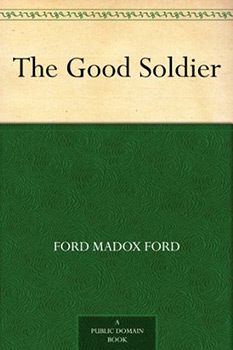
I’ve intended to read The Good Soldier for some time because it ends up on all those top 100 lists. I’ve always been skeptical of those lists as they tend to come from anglo portals like The Guardian and their mere existence raises questions about process. I imagine a coterie of silver-haired pipe-smoking waning white Imperialists sitting around the fireside with their brandies saying “Hrrmph” and smacking their lips until their chins fall to their chests and their brandies spill on the floor. I wish there was the literary equivalent of The White Pube to challenge the long-standing but ever-more-obviously idiotic standards we apply to secure our cherished literary canon. The question that always plagues me when I knock one more book off that list is: as a white guy reading white guy books from a list promoted by white guys, how much of the literary universe am I missing when I blinker myself in this way? My neat gated literary community is starting to feel stale when, just beyond that fence, there’s a seemingly endless stretch of literary riches to explore.
The question in this instance is whether The Good Soldier is one more of those novels that wriggles its bum onto the canonical couch by knocking others off? Or is there something about it that allows it to evade the usual accusations? By now, even people who haven’t read this novel know that what makes it famous is its narrator. John Dowell may be an engaging raconteur, but he can’t be trusted to get the facts right, sometimes omitting details, or misinterpreting them, or lying outright. For example, in what qualifies as some of the most virtuoso writing ever committed to paper, the narrator tells how his wife invents a story about a weak heart to keep him from her bedroom so she can have an affair with another man, and even as he tells this he fails to understand that he himself is the brunt of a cruel joke. The narrator’s apparent lack of personal insight is stunning.
Taking our cue from the narrator, we realize that an important feature of the novel, perhaps its entire point, is that nothing is as it seems. Ford makes a grand epistemological statement. What we claim to know rests on a foundation of quicksand. Already, for two generations, England, Western Europe, maybe the entire world, had been nursing a vague suspicion that Darwin had ripped their comfy view of Truth and Certainty out from under them. But it wasn’t until writers and painters took to it at the beginning of the 20th century that what we subsequently labelled Modernism gave wider expression to this suspicion.
There is a sense in which The Good Soldier looks backwards to pre-Darwinian times. The characters are rich and entitled. Like a good Jane Austen novel, they worry about matches that will garner £20,000 a year. (Despite the orderly social conventions, the characters are so promiscuous, they make Woodstock look like a convent.) As in Austen, income comes from tenants living on their lands. At one point, Dowell mentions his “darky” servant named Julius. People who stand beneath them, socially or racially, are either expendable or, more typically, poor unfortunates to be treated with a benevolent regard. As readers, we must share this view with Dowell; he is, after all, our window onto this world. Nevertheless, as modestly liberal readers approaching the novel more than a century later, the text is difficult to stomach. The backward gaze also appears in more innocuous ways. Edward Ashburnham, the eponymous good soldier, invents and patents a new Army stirrup. The novel is set in 1904, but Ford, writing at the outbreak of World War I, must have realized that horses were losing a competition with internal combustion engines and would end up rotting amongst the corpses on the battlefields of Europe. The good soldier belongs to a vanishing age and … well … good riddance.
What lies between the book’s covers, including its narrator, is absolutely rotten. But that doesn’t mean it’s a rotten book. The book can be taken as social commentary directed at Imperialism, whiteness, paternalism. We are meant to respond with revulsion because we are presented with a critical view of something that is, indeed, revolting. The problem with this conclusion is that it is premised on us having access to and understanding the author’s intentions. Yes, we can sift through Ford Madox Ford’s letters and autobiographical writings and see what we can find but, even then, how can we be certain that he isn’t omitting details, or misinterpreting them, or lying outright? We shift the problem of the unreliable narrator by one degree to the unreliable author. The fact of the matter is: even if we had evidence of Ford’s intentions, we would have no way to certify that this information is useful. Once the quicksand seeps in at one door, it seeps in at all doors. Maybe the best we can do is say: this is how I read the book; yes, it’s only my interpretation, but that’s all I’ve got.
The Good Soldier, by Ford Madox Ford, is in the public domain and can be downloaded for free from Project Gutenberg.